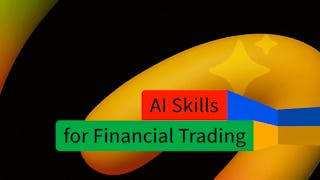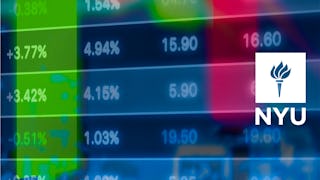In this course, you’ll learn about the fundamentals of trading, including the concept of trend, returns, stop-loss, and volatility. You will learn how to identify the profit source and structure of basic quantitative trading strategies. This course will help you gauge how well the model generalizes its learning, explain the differences between regression and forecasting, and identify the steps needed to create development and implementation backtesters. By the end of the course, you will be able to use Google Cloud Platform to build basic machine learning models in Jupyter Notebooks.


Enjoy unlimited growth with a year of Coursera Plus for $199 (regularly $399). Save now.


Introduction to Trading, Machine Learning & GCP
This course is part of Machine Learning for Trading Specialization

Instructor: Jack Farmer
66,222 already enrolled
Included with
(891 reviews)
Recommended experience
What you'll learn
Understand the fundamentals of trading, including the concepts of trend, returns, stop-loss, and volatility.
Define quantitative trading and the main types of quantitative trading strategies.
Understand the basic steps in exchange arbitrage, statistical arbitrage, and index arbitrage.
Understand the application of machine learning to financial use cases.
Skills you'll gain
- Model Evaluation
- Time Series Analysis and Forecasting
- Machine Learning
- Finance
- Technical Analysis
- Statistical Machine Learning
- Applied Machine Learning
- Artificial Neural Networks
- Cloud Platforms
- Financial Trading
- Deep Learning
- Supervised Learning
- Predictive Modeling
- Model Deployment
- Artificial Intelligence and Machine Learning (AI/ML)
- Machine Learning Methods
- Google Cloud Platform
- Securities Trading
- Financial Forecasting
- Machine Learning Algorithms
Details to know

Add to your LinkedIn profile
8 assignments
See how employees at top companies are mastering in-demand skills

Build your subject-matter expertise
- Learn new concepts from industry experts
- Gain a foundational understanding of a subject or tool
- Develop job-relevant skills with hands-on projects
- Earn a shareable career certificate

There are 4 modules in this course
In this module you will be introduced to the fundamentals of trading. You will also be introduced to machine learning. Machine Learning is both an art that involves knowledge of the right mix of parameters that yields accurate, generalized models and a science that involves knowledge of the theory to solve specific types of problems.
What's included
25 videos3 readings4 assignments
In this module you will be introduced to supervised machine learning and some relevant algorithms commonly applied to trading problems. You will get some hands-on experience building a regression model using BigQuery Machine Learning
What's included
6 videos1 reading1 assignment
In this module you will learn about ARIMA modeling and how it is applied to time series data. You will get hands-on experience building an ARIMA model for a financial dataset.
What's included
11 videos1 assignment
In this module you'll learn about neural networks and how they relate to deep learning. You'll also learn how to gauge model generalization using regularization, and cross-validation. Also, you'll be introduced to Google Cloud Platform (GCP). Specifically, you'll be shown how to leverage GCP for implementing trading techniques.
What's included
5 videos1 reading2 assignments1 discussion prompt
Earn a career certificate
Add this credential to your LinkedIn profile, resume, or CV. Share it on social media and in your performance review.
Instructor

Explore more from Machine Learning
 Status: Free Trial
Status: Free TrialNew York Institute of Finance
 Status: Free Trial
Status: Free TrialGoogle Cloud
 Status: Free Trial
Status: Free TrialNew York Institute of Finance
 Status: Free Trial
Status: Free TrialNew York University
Why people choose Coursera for their career




Learner reviews
891 reviews
- 5 stars
44.10%
- 4 stars
28.84%
- 3 stars
14.02%
- 2 stars
4.71%
- 1 star
8.30%
Showing 3 of 891
Reviewed on Jul 13, 2021
Even are more basic knowledge of Trading and ML, still with specific data relative Trading and finance, Great!
Reviewed on Feb 2, 2021
Exactly what I was looking for and at the adequate level. I'm a trader and a machine learning developer, and this course helped me in both topics
Reviewed on Dec 25, 2019
Would be nice to have some extra step at the end of the lad to actually build a trading strategy instead of stopping at the fitting of the model
Frequently asked questions
To access the course materials, assignments and to earn a Certificate, you will need to purchase the Certificate experience when you enroll in a course. You can try a Free Trial instead, or apply for Financial Aid. The course may offer 'Full Course, No Certificate' instead. This option lets you see all course materials, submit required assessments, and get a final grade. This also means that you will not be able to purchase a Certificate experience.
When you enroll in the course, you get access to all of the courses in the Specialization, and you earn a certificate when you complete the work. Your electronic Certificate will be added to your Accomplishments page - from there, you can print your Certificate or add it to your LinkedIn profile.
Yes. In select learning programs, you can apply for financial aid or a scholarship if you can’t afford the enrollment fee. If fin aid or scholarship is available for your learning program selection, you’ll find a link to apply on the description page.
More questions
Financial aid available,







